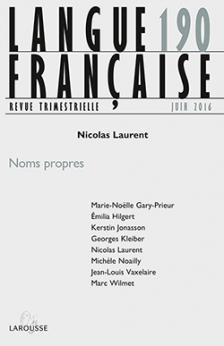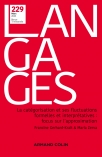
Langue française n° 190 (2/2016)
Pour acheter ce numéro, contactez-nous
Recevez les numéros de l'année en cours et accédez à l'intégralité des articles en ligne.
Les linguistes mettent souvent en avant la fonction « distinctive » du Np et décrivent le référent de celui-ci comme occurrence d’une catégorie conceptuelle. Toutefois, ce n’est pas parce que l’x nommé est ou peut être catégorisé que son Np signifie nécessairement cette catégorisation. Ce constat sert de point de départ à la relativisation de l’hypothèse occurrentielle. Celle-ci se fait en quatre temps. On essaie de montrer que le Np réfère au mieux à une occurrence libre, en attente de catégorisation, que les noms catégorisants présents dans certains Np ne constituent pas véritablement un contre-argument, que le Np unifie des occurrences internes, et enfin que (la) Lune, (le) Soleil... peuvent être considérés, dans ce cadre, comme des Np.
Linguists often highlight the “distinctive” function of the proper noun and describe its referent as the occurrence of a conceptual category. However, this is not due to the fact that the x named is, or can be, categorized that its proper noun necessarily signifies this categorization. This observation is the starting point for the relativization of the occurential hypothesis, which is carried out in four stages. We attempt to show that the proper noun best refers to a free occurrence, awaiting categorization; that the categorising nouns present in certain proper nouns do not constitute a veritable counter-argument; that proper nouns unify internal occurrences, and finally that (la) Lune, (le) Soleil, etc. can be considered, within this framework, as proper nouns.

